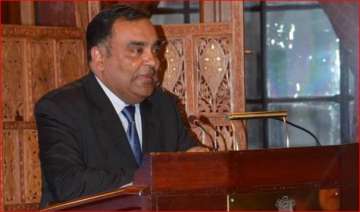Britain has become a haven for fugitives, says Indian envoy YK Sinha
“We feel the UK has become a haven for fugitives from justice. The way the UK permits anti-India activity on its soil, in Delhi people are quite perturbed about that," the Indian envoy said.
In an indirect reference to absconding Indian liquor baron Vijay Mallya’s ongoing extradition case in a London court, India’s High Commissioner to UK YK Sinha today said that Britain has become a “haven” for fugitives from justice.
“We feel the UK has become a haven for fugitives from justice. The way the UK permits anti-India activity on its soil, in Delhi people are quite perturbed about that. We are also a democratic society but we do not discuss issues that affect our friends and allies,” Sinha said while speaking at the launch of a new book on India-UK ties titled ‘Winning Partnership: India-UK Relations Beyond Brexit’ in London on Monday.
The Indian High Commissioner also called on the British media to get more “up to speed with where India is today” in its reporting.
Mallya, the 61-year-old chief of the erstwhile Kingfisher Airlines who owes over Rs 9,000 crore to various Indian banks, has been living in self-imposed exile in Britain since March last year.
He was arrested by Scotland Yard in April on fraud allegations, triggering an official extradition process in the British courts.
He attended a central London police station for his arrest and was released on conditional bail a few hours later after providing a bail bond worth 650,000 pounds, assuring the court of abiding by all conditions associated with extradition proceedings, such as the surrender of his passport and a ban on him possessing any travel documents.
India has also told Britain that if it does not recognise that the “epicentre” of terrorism lies on India’s west then there is “very little” scope to strengthen the bilateral cooperation.
Sinha said the two countries must look beyond striking a free trade agreement (FTA) and achieve a congruence of views on “core issues”.
“A winning partnership needs to be constructive, it is not just about an FTA or cultural links. There is a lot of work to do on areas such as terrorism. For us, Af-Pak (Afghanistan-Pakistan) is our neighbourhood. The epicentre of terrorism is on our west and if that is not recognised (by the UK), then I am afraid there is very little we will be able to do together,” he said.
“India has borne the brunt of terrorism for decades and until that is recognised, bilateral cooperation will not lead to too much success,” the senior diplomat noted.
Describing the UK’s policy in the Af-Pak region as “to set a thief to catch a thief” by trying to get Pakistan and Afghanistan talking, the Indian envoy added: “It is time to realise where the problem actually lies. It is not just us, other neighbours are also complaining. It is something that has to be recognised and not tip-toed around because if that continues, we will see that epicentre of terrorism thriving”.
‘Winning Partnership’ is a collection of essays by around 24 authors from across the fields of politics, business, finance, strategic affairs and culture on various aspects of the India-UK relationship and its scope as Britain prepares to leave the European Union (EU).
“This book is a repository of ideas intended to open a fresh dialogue. In some ways, India and the UK are so comfortable with each other that we are in danger of falling into the trap of becoming more of a transactional relationship. The real challenge is how to convert this into a transformational one and move from a special relationship to a genuinely global one,” said Manoj Ladwa, the founder and CEO of UK-based publisher India Inc. and editor of the book.
“The UK today is competing with the rest of the world to grab India’s attention. It needs to have a more positive approach to issues like student migration,” added Cobra Beer founder Lord Karan Bilimoria, one of the contributors to the book.
(With PTI inputs)
